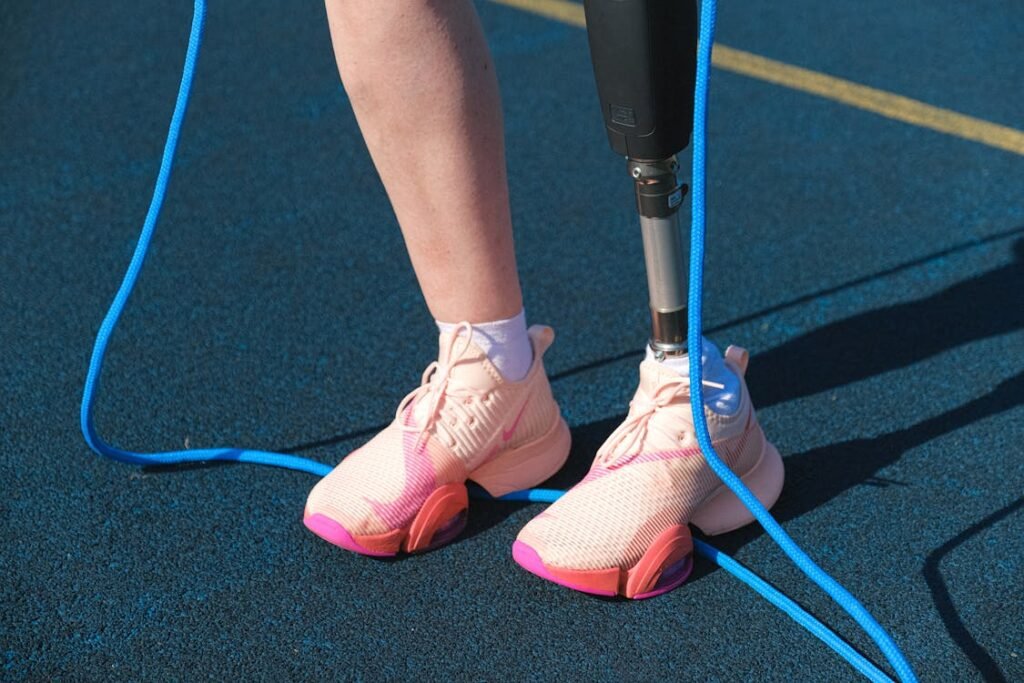Sports have the power to change lives. They build strength, boost confidence, and create a sense of belonging. For amputees, adaptive sports open up a world of new possibilities, proving that limb loss does not mean the end of an active lifestyle. Whether it’s running, swimming, cycling, or team sports, there is something for everyone.
Getting started with adaptive sports can feel overwhelming at first. Questions like “What sport is right for me?” or “What kind of prosthetic will I need?” are common. The good news is that adaptive sports are designed to be inclusive, with specialized equipment and training methods that make participation easier.
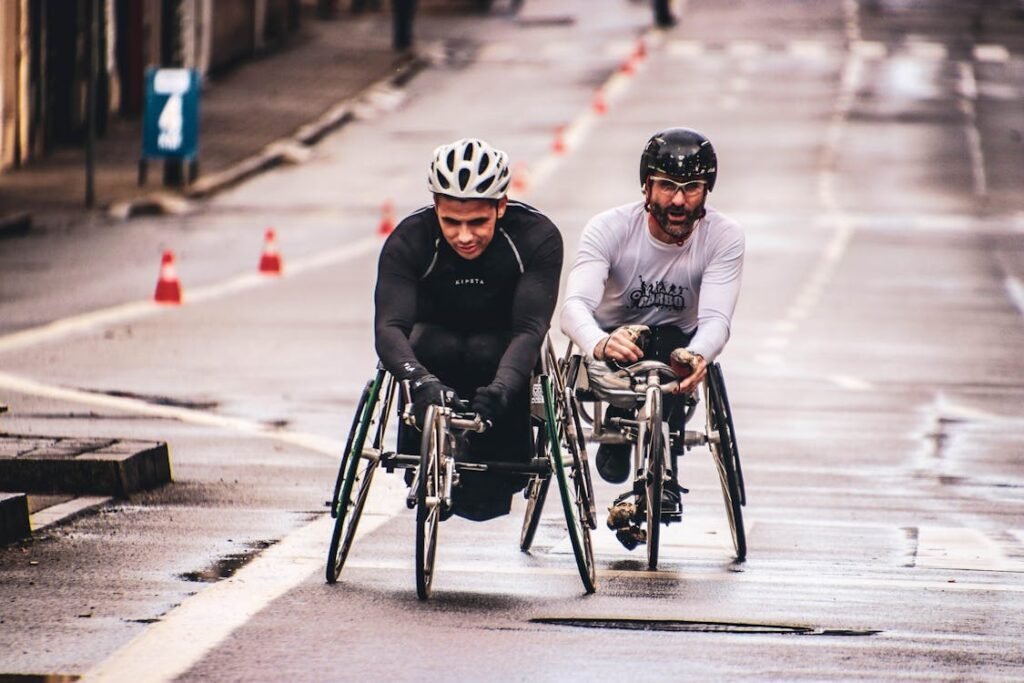
Getting Started with Adaptive Sports
Beginning any new sport requires patience and practice, but adaptive sports come with unique considerations. The first step is understanding your body, your strengths, and any challenges you might face.
Whether you have recently undergone an amputation or have been living with limb loss for years, sports can play a significant role in improving both physical and mental well-being.
Finding the Right Sport for You
Choosing the right sport depends on personal interests, physical ability, and available resources. Some people prefer individual activities like swimming or running, while others thrive in team environments such as basketball or soccer.
The best approach is to explore different options, attend a few training sessions, and see what feels right.
Water sports are an excellent starting point, as they reduce the impact on joints and provide a full-body workout. Swimming, kayaking, and rowing are popular choices for amputees because they allow for smooth and controlled movements.
On land, activities like cycling and wheelchair racing offer speed and endurance challenges, while rock climbing and skiing test balance and coordination.
For those who enjoy competitive sports, adaptive versions of soccer, basketball, tennis, and even martial arts are available. These sports are played with modified rules and specialized equipment to accommodate different types of mobility.
Many organizations host local and international competitions, allowing athletes to showcase their skills and connect with others who share similar experiences.
Understanding the Role of Prosthetics in Sports
Sports prosthetics are designed to enhance movement, improve comfort, and provide the necessary support for various physical activities.
Unlike everyday prosthetics, which focus on general mobility, sports prosthetics are built for performance. They are lightweight, durable, and tailored to specific activities.
For running, blade prosthetics are commonly used. These carbon-fiber limbs store energy and release it with each step, creating a natural and powerful stride.
Swimmers often use waterproof prosthetics or adaptive swim fins that help with propulsion. Cyclists may require prosthetics with adjustable angles to match the mechanics of pedaling.
Upper-limb amputees also have specialized sports prosthetics. For example, gripping attachments can help in activities like weightlifting, rowing, or playing racquet sports.
Many of these prosthetics come with interchangeable parts, allowing athletes to switch between different attachments depending on their needs.
Adapting to a sports prosthetic takes time, and working with a prosthetist ensures the best fit and functionality. At Robobionics, we specialize in customized prosthetic solutions designed for active lifestyles.
Our goal is to help individuals find the right fit so they can pursue sports without limitations.
Training and Rehabilitation for Adaptive Athletes
Starting any new sport requires proper training, and for amputees, a structured approach ensures a smoother transition. Professional coaching, physical therapy, and rehabilitation programs help build strength, endurance, and technique.
Balance and coordination are key areas of focus, especially for lower-limb amputees. Learning how to shift weight correctly, improve stability, and move efficiently with a prosthetic makes a significant difference in performance.
Strength training helps build the muscles needed to support prosthetic use, while flexibility exercises improve mobility.
Home-based rehabilitation programs, like those offered by Robobionics, provide gamified exercises that make learning easier and more engaging.
These programs help athletes develop muscle memory, improve reaction times, and build the confidence needed for real-world sports activities.
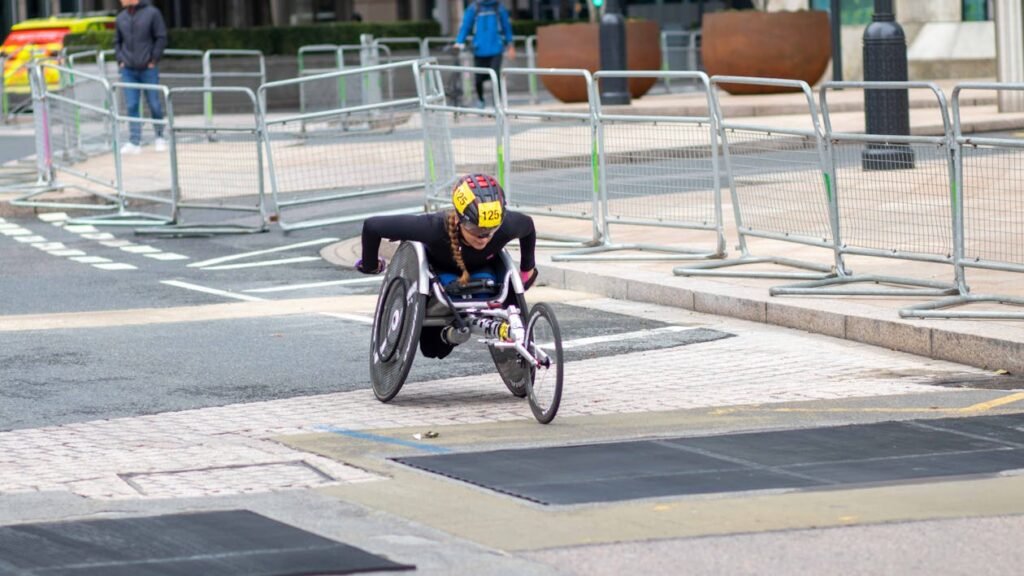
Overcoming Challenges in Adaptive Sports
Starting a new sport is exciting, but it also comes with challenges. For amputees, the learning process involves physical adjustments, mental resilience, and finding the right support system.
While these obstacles may seem daunting at first, the right mindset and resources can turn them into opportunities for growth.
Building Strength and Endurance
Physical fitness plays a crucial role in adaptive sports. Many amputees experience muscle loss or imbalance due to changes in movement patterns. Strength training is essential for building the muscles that support the prosthetic and improve overall mobility.
Endurance is another key factor. Sports like running, cycling, and swimming require sustained effort over long periods. Training programs that focus on gradually increasing stamina help athletes develop the ability to perform for extended durations without fatigue.
Working with a coach or physical therapist ensures that training is done correctly and safely. They can design personalized workout routines that target specific muscle groups, improve cardiovascular health, and enhance performance in a chosen sport.
Adapting to a New Way of Moving
Amputees often have to relearn basic movements, especially if they are using a sports prosthetic for the first time. Unlike everyday walking, sports require quick turns, sudden stops, and rapid acceleration.
These movements feel different with a prosthetic, and it takes practice to adapt.
Balance and coordination training help improve stability, making movements smoother and more controlled.
Drills that simulate real-game scenarios or race conditions allow athletes to get used to the demands of their sport. Over time, these exercises build muscle memory, making movements feel more natural.
Mental Strength and Confidence
Sports are as much a mental game as they are a physical one. Many amputees face s21elf-doubt or fear of failure when trying a new activity. The key to success is persistence and a positive mindset.
Building confidence starts with small wins. Setting realistic goals, celebrating progress, and pushing past self-imposed limits helps athletes stay motivated.
Surrounding oneself with a supportive community of fellow adaptive athletes, trainers, and mentors can also make a big difference.
Visualization techniques, mindfulness, and mental conditioning exercises help athletes stay focused and calm under pressure. These skills are especially useful for competitive sports, where mental strength can determine performance.
Finding the Right Equipment and Support
Having the right prosthetic and adaptive equipment makes all the difference in sports performance. A well-fitted sports prosthetic enhances movement, reduces strain, and allows for better control. Working with a skilled prosthetist ensures the device is tailored to an individual’s needs.
At Robobionics, we understand the unique challenges faced by amputees in sports. Our team provides customized prosthetic solutions designed for durability, comfort, and performance.
Whether you need a running blade, a swimming prosthetic, or a gripping attachment for weightlifting, we are here to help.

How to Get Involved in Adaptive Sports
Joining the world of adaptive sports is an exciting journey that can lead to personal growth, better fitness, and a strong sense of community. Whether you’re looking to stay active, compete professionally, or simply enjoy a new hobby, there are many ways to get started.
Finding the right resources, connecting with the right people, and taking the first step can make all the difference.
Finding Local Adaptive Sports Programs
One of the best ways to begin is by searching for local adaptive sports programs. Many cities and communities have organizations that offer training, equipment, and coaching specifically for individuals with limb loss.
Hospitals, rehabilitation centers, and prosthetic clinics often have connections to these programs and can help direct you to the right place.
Nonprofit organizations dedicated to adaptive sports also host events, workshops, and training sessions. These programs create a supportive environment where beginners can learn the basics, try different sports, and build confidence before committing to a specific activity.
Many programs also offer loaner equipment, making it easier to test different prosthetics before investing in one.
Connecting with Other Athletes
Surrounding yourself with a community of adaptive athletes can be incredibly motivating. Meeting others who have gone through similar experiences provides encouragement, inspiration, and practical advice.
Connecting with local or online support groups can help you learn from experienced athletes and find opportunities to participate in events.
Many social media groups, forums, and online communities exist where amputees share their experiences in sports, offer tips on prosthetics, and discuss training strategies.
These spaces provide valuable insights that can help newcomers overcome challenges and stay motivated throughout their journey.
Exploring Competitive Opportunities
For those interested in competition, adaptive sports offer numerous opportunities to test skills at different levels. From local tournaments to international championships, there are events tailored to different abilities and interests.
Organizations like the Paralympic Committee of India and other national bodies oversee competitions in various sports, offering structured pathways for athletes who wish to compete professionally.
Athletes who want to take their performance to the next level can seek specialized coaching and training programs.
Working with experienced trainers who understand the mechanics of adaptive sports helps refine technique, improve speed and endurance, and develop mental toughness for high-level competition.
Funding and Sponsorship for Adaptive Sports
Sports prosthetics and specialized equipment can be costly, but there are financial assistance programs that help athletes access the tools they need.
Government grants, nonprofit organizations, and corporate sponsorships are available to support individuals who want to pursue adaptive sports. Some sports organizations also offer scholarships for training, travel, and participation in events.
At Robobionics, we believe that cost should never be a barrier to an active lifestyle. We offer affordable, high-quality prosthetic solutions and connect athletes with funding resources that can support their journey.
Our goal is to make adaptive sports accessible to everyone, regardless of financial constraints.
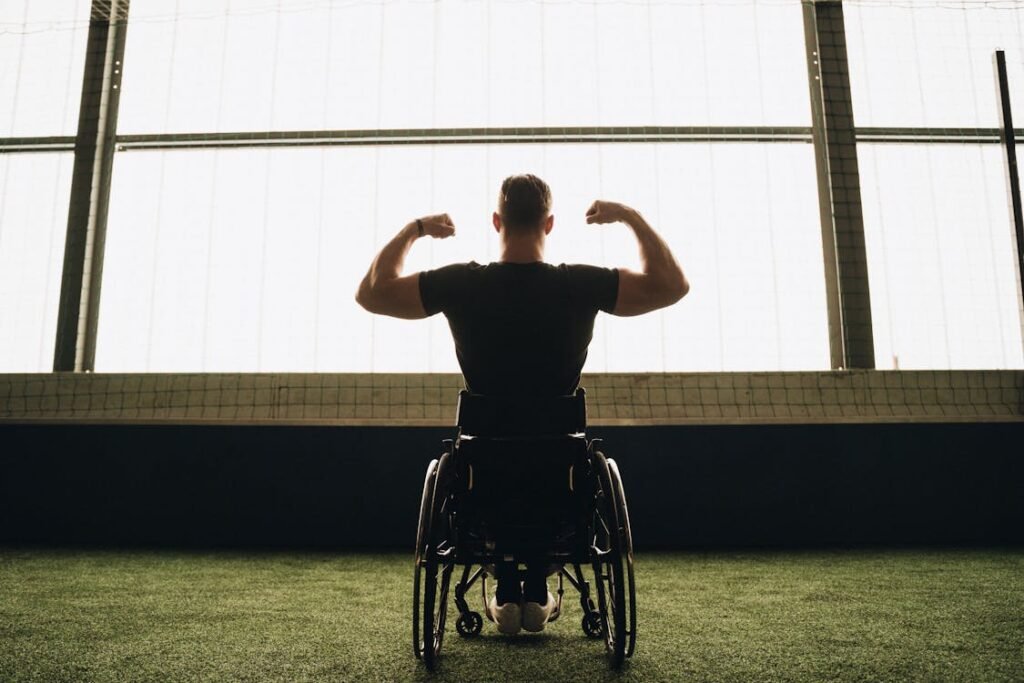
The Life-Changing Benefits of Adaptive Sports
Adaptive sports do more than just provide a way to stay active—they transform lives. From improving physical health to boosting mental well-being, sports offer countless benefits for amputees.
The journey from trying a new sport to mastering it can be incredibly empowering, proving that limitations exist only in the mind.
Physical Health and Rehabilitation
One of the biggest advantages of adaptive sports is the impact on overall health. Regular physical activity helps improve cardiovascular fitness, muscle strength, and flexibility.
For amputees, it also plays a crucial role in rehabilitation by improving balance, coordination, and mobility.
Many individuals who start adaptive sports notice improvements in posture, endurance, and energy levels.
Weight-bearing activities strengthen bones and reduce the risk of osteoporosis, while aerobic exercises promote heart health. Over time, these benefits lead to a greater sense of independence and control over one’s body.
Mental and Emotional Well-Being
Beyond the physical benefits, sports provide a powerful boost to mental health. Engaging in a sport helps reduce stress, anxiety, and depression by releasing endorphins—the body’s natural mood boosters.
It also improves self-esteem, giving individuals the confidence to challenge themselves and push past perceived limitations.
For many amputees, the transition to life with a prosthetic can be emotionally challenging. Participating in sports helps shift the focus from what was lost to what is still possible.
Every small achievement—whether it’s running a short distance, scoring a goal, or completing a swim lap—reinforces the idea that limb loss does not mean the end of an active life.
Building a Sense of Community
Adaptive sports bring people together. They create friendships, mentorships, and support systems that extend beyond the playing field. Whether competing on a team or training alongside others, being part of a community fosters a sense of belonging.
For those who have struggled with isolation, sports provide an opportunity to connect with others who share similar experiences. Adaptive sports organizations, support groups, and training camps help build relationships that provide encouragement and motivation.
The bonds formed through sports often last a lifetime, creating a network of people who uplift and inspire each other.
Pushing the Boundaries of What’s Possible
Adaptive sports prove that amputees are capable of extraordinary achievements. From Paralympic athletes breaking records to weekend warriors conquering personal fitness goals, every effort contributes to changing perceptions about disability.
The growing presence of adaptive athletes in mainstream sports highlights their strength, skill, and determination.
Every person who takes part in adaptive sports helps break barriers and redefine what is possible. By showing the world that ability is not defined by limb loss, athletes inspire others to take charge of their own journeys.
At Robobionics, we celebrate the resilience of adaptive athletes and support them with cutting-edge prosthetic solutions.
If you’re ready to explore sports and see what’s possible, schedule a free consultation with us today. Let’s take the first step toward an active, limitless future together!
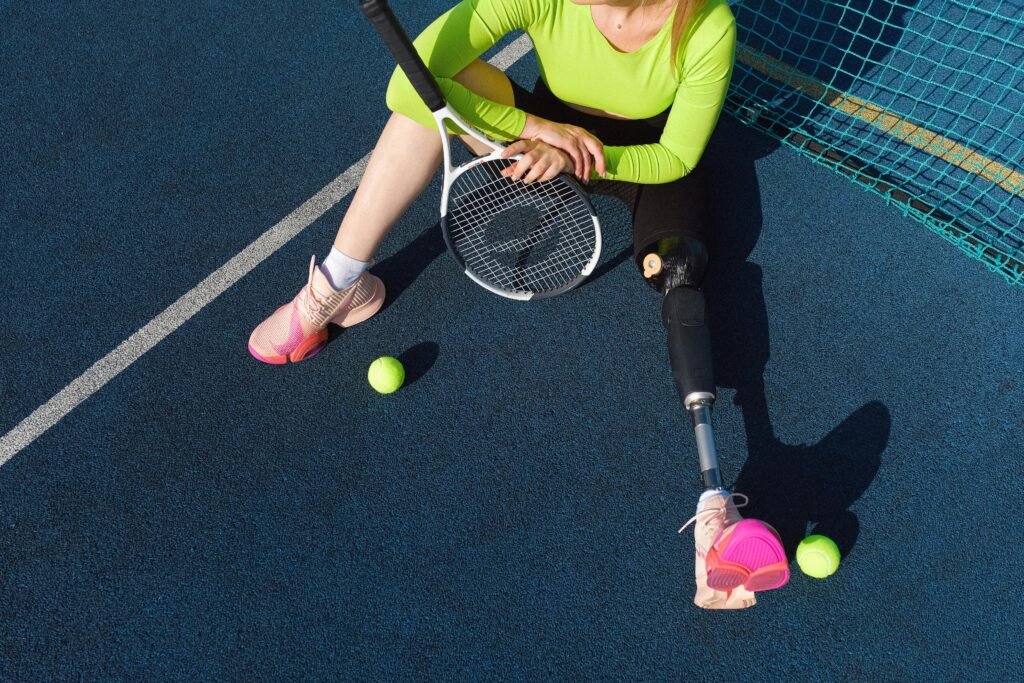
The Role of Technology in Advancing Adaptive Sports
The world of adaptive sports is evolving rapidly, thanks to groundbreaking technological advancements. From cutting-edge prosthetic designs to smart training systems, technology is helping amputees push past limitations and achieve new athletic milestones.
Innovations in materials, biomechanics, and artificial intelligence are making sports prosthetics more efficient, comfortable, and adaptable than ever before.
Advancements in Sports Prosthetics
Modern sports prosthetics are no longer just functional replacements for lost limbs—they are precision-engineered tools designed for performance.
One of the most significant advancements is the development of carbon-fiber prosthetic blades, which mimic the energy return of natural tendons. These blades store and release energy with each step, allowing amputees to run, jump, and sprint with remarkable efficiency.
For swimmers, hydrodynamic prosthetics have changed the game. Waterproof limbs with adaptive fins allow for smoother movement in the water, helping athletes generate speed and control.
Some designs even integrate buoyancy control systems, ensuring that prosthetic limbs move naturally in aquatic environments.
Adaptive cycling has also seen major improvements, with prosthetics featuring adjustable knee and ankle joints that replicate the natural motion of pedaling.
These custom-fit designs improve comfort and reduce strain, allowing amputees to ride for longer distances with greater ease.
Smart Prosthetics and AI-Driven Performance Enhancement
Artificial intelligence is transforming adaptive sports by making prosthetic limbs more responsive to an athlete’s movements.
Smart prosthetics equipped with microprocessors can adjust in real time, adapting to different terrains, speeds, and movement patterns. This allows users to experience greater balance, agility, and control in high-performance sports.
Incorporating sensory feedback technology, some advanced prosthetic limbs can even send signals to the nervous system, enabling a more natural feel. This enhances coordination and reaction time, giving athletes a better connection between their prosthetic and their body.
Wearable fitness trackers and AI-driven coaching apps are also helping amputees improve their training routines. These systems analyze movement, provide feedback on form, and suggest personalized workout adjustments.
By integrating real-time data, athletes can refine their techniques, prevent injuries, and maximize performance.
Virtual Reality and Gamified Rehabilitation
One of the biggest challenges for new athletes is adapting to their prosthetic and learning sport-specific techniques.
Virtual reality (VR) training has emerged as a game-changing tool, allowing amputees to practice movements in a controlled digital environment before taking them into the real world.
VR-based rehabilitation programs simulate sports scenarios, helping users build muscle memory and improve coordination. These interactive exercises make training more engaging and accessible, especially for those recovering from surgery or adjusting to a new prosthetic.
At Robobionics, we integrate gamified rehabilitation to make the transition into adaptive sports easier and more enjoyable.
Our approach blends innovative technology with real-world application, ensuring that athletes feel confident and prepared when stepping onto the field, track, or water.
Technology is not just making adaptive sports more accessible—it’s redefining what’s possible. As advancements continue, the future promises even greater opportunities for amputee athletes to reach new heights.
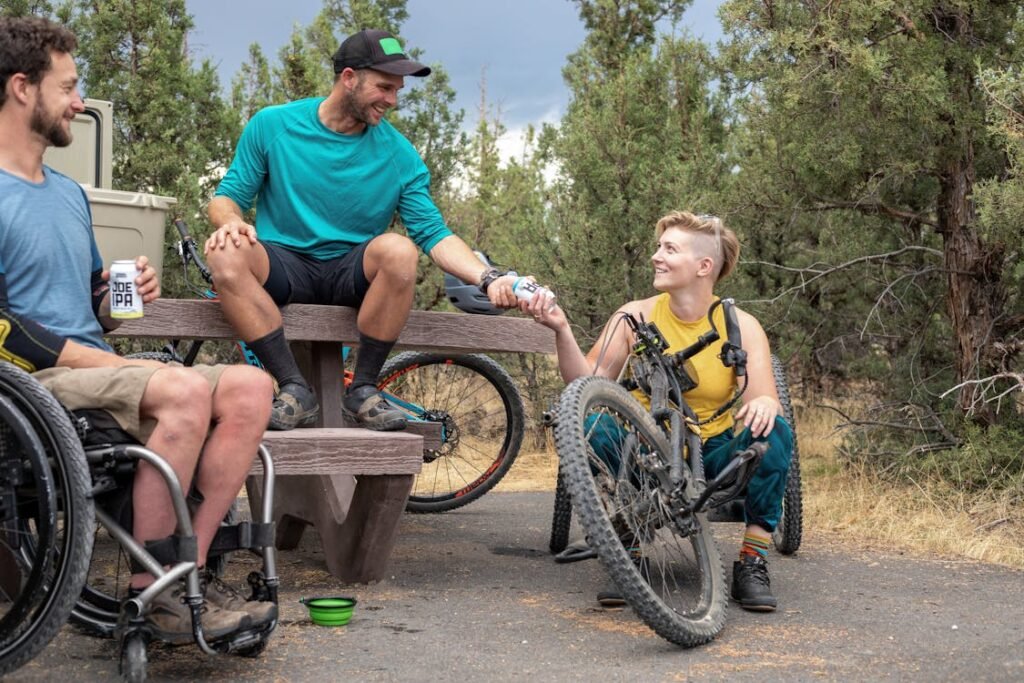
Breaking Stereotypes: Changing the Perception of Amputees in Sports
Adaptive sports are not just about competition and fitness—they are a movement that is reshaping societal perceptions of disability. For years, amputees were often seen as individuals with limitations rather than athletes with potential.
Today, the visibility of adaptive sports is breaking stereotypes, proving that limb loss does not define a person’s capabilities.
The Media’s Role in Changing Perceptions
Media representation plays a crucial role in shifting public attitudes. As more adaptive athletes gain recognition in mainstream sports, the narrative around disability is changing.
Events like the Paralympic Games, international adaptive competitions, and even extreme sports challenges have showcased the strength, resilience, and skill of amputee athletes.
Television, social media, and documentary films are also bringing inspiring stories to a global audience. Athletes like Oscar Pistorius, Deepa Malik, and Manasi Joshi have demonstrated that adaptive sports are just as competitive and thrilling as able-bodied events.
Their journeys have inspired millions, encouraging more people with disabilities to take up sports and challenge misconceptions.
Shifting the Mindset in Everyday Life
Outside of professional competition, adaptive sports have created a ripple effect in everyday life. Schools, workplaces, and communities are becoming more inclusive, encouraging people with limb loss to participate in physical activities without stigma.
Programs that integrate able-bodied and adaptive athletes are fostering a culture of equality, where performance is valued over physical differences.
One of the most significant mindset shifts has been the recognition that prosthetic limbs are not a disadvantage but a tool for empowerment.
In fact, some advanced prosthetics offer features that even exceed human capabilities, such as energy-return running blades or climbing-specific prosthetic arms. These innovations challenge the outdated notion that amputation means a permanent limitation.
Creating More Inclusive Sports Opportunities
While awareness is growing, there is still work to be done in making sports fully inclusive. Many gyms, recreational centers, and schools still lack adaptive training equipment and programs.
Increasing accessibility requires investment in specialized coaching, better prosthetic technology, and more representation of amputee athletes at all levels of competition.
Brands and organizations also have a responsibility to promote inclusivity. By sponsoring adaptive sports events, featuring amputee athletes in advertisements, and supporting research in prosthetic development, they can contribute to a more accepting and diverse sports culture.
At Robobionics, we believe in challenging the status quo. Our mission is to empower amputees to see sports as an opportunity, not an obstacle.
Through advanced prosthetic solutions, rehabilitation programs, and partnerships with adaptive sports organizations, we are committed to making active lifestyles accessible to all.
The future of adaptive sports is bright. With continued advocacy, technology, and community support, the world is moving toward a place where amputee athletes are celebrated not for overcoming disability, but for their undeniable talent, dedication, and passion for the game.
Conclusion
Adaptive sports are more than just activities—they are a gateway to strength, confidence, and limitless possibilities. Whether it’s running, swimming, cycling, or team sports, amputees are proving every day that limb loss is not a barrier to success. With the right prosthetic, training, and mindset, anyone can enjoy the physical and mental benefits of sports.
From cutting-edge prosthetic technology to growing media representation, the world is becoming more inclusive of adaptive athletes. The journey may come with challenges, but the rewards—improved health, strong community connections, and personal growth—are well worth the effort.
At Robobionics, we are committed to helping amputees reclaim their active lifestyles. Whether you are exploring sports for the first time or looking to compete at a high level, our advanced prosthetic solutions and rehabilitation programs are designed to support your journey.
Take the first step today. Book a free consultation with us and discover how adaptive sports can transform your life!



